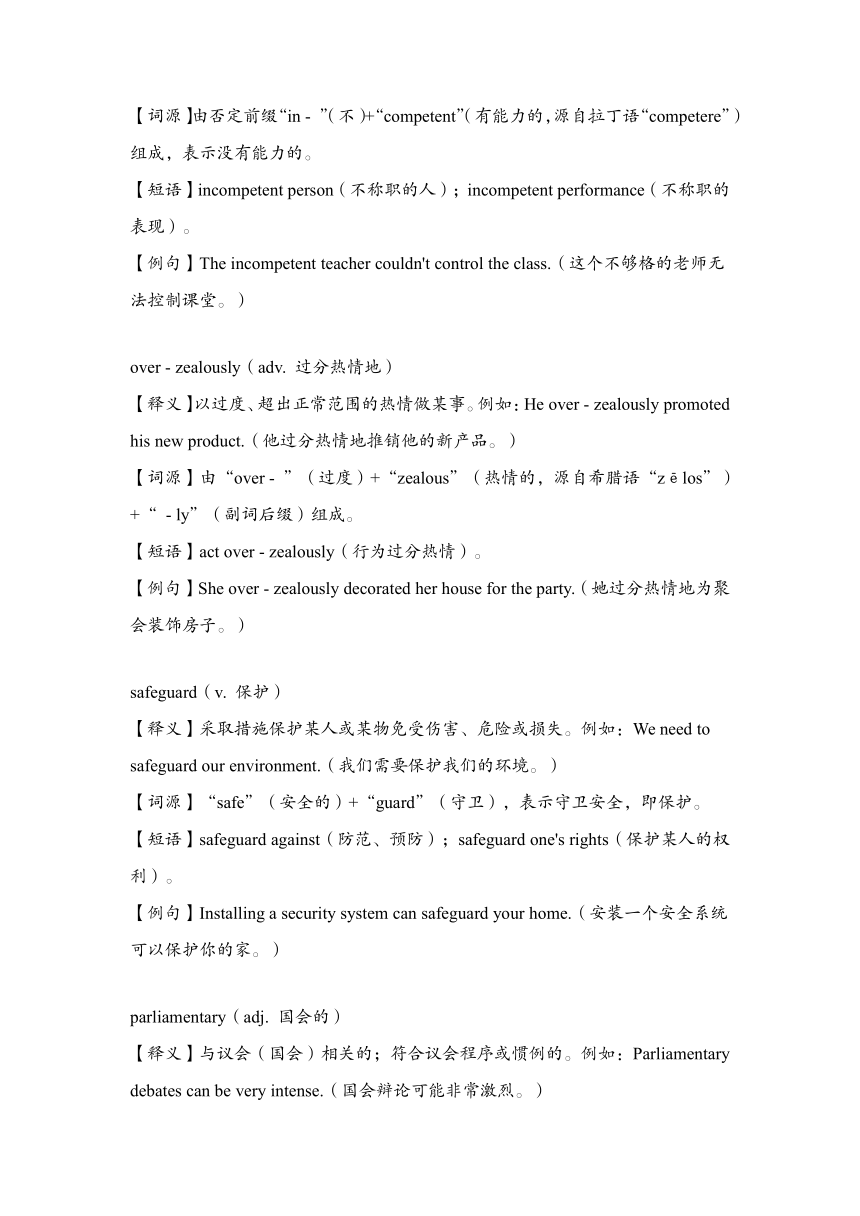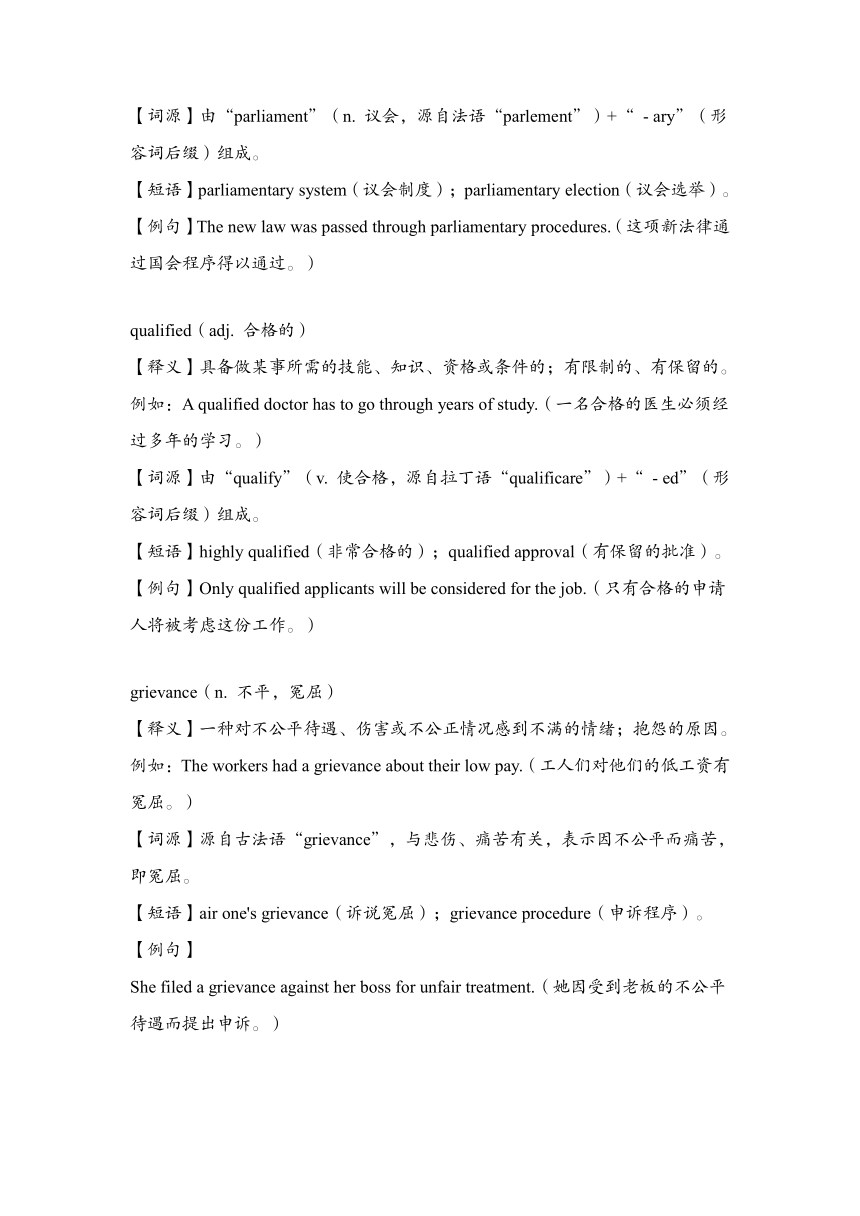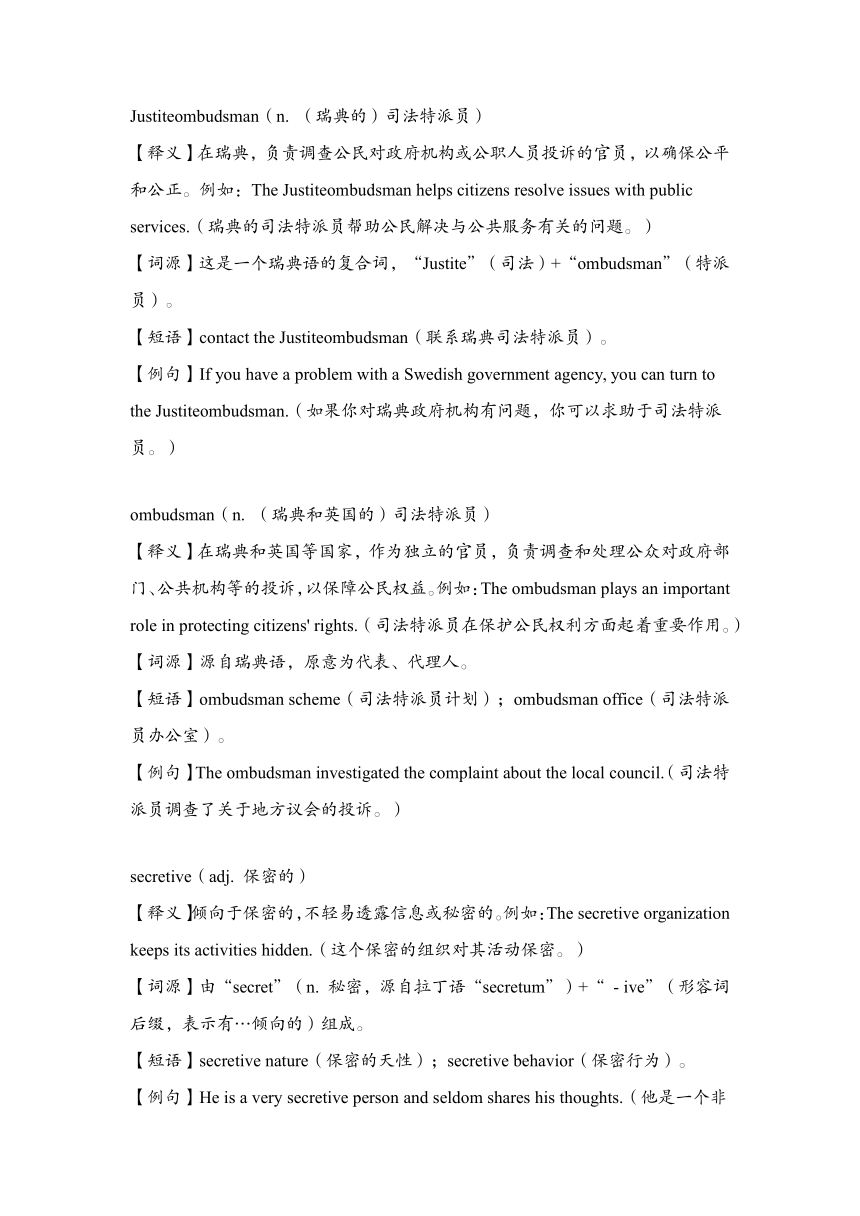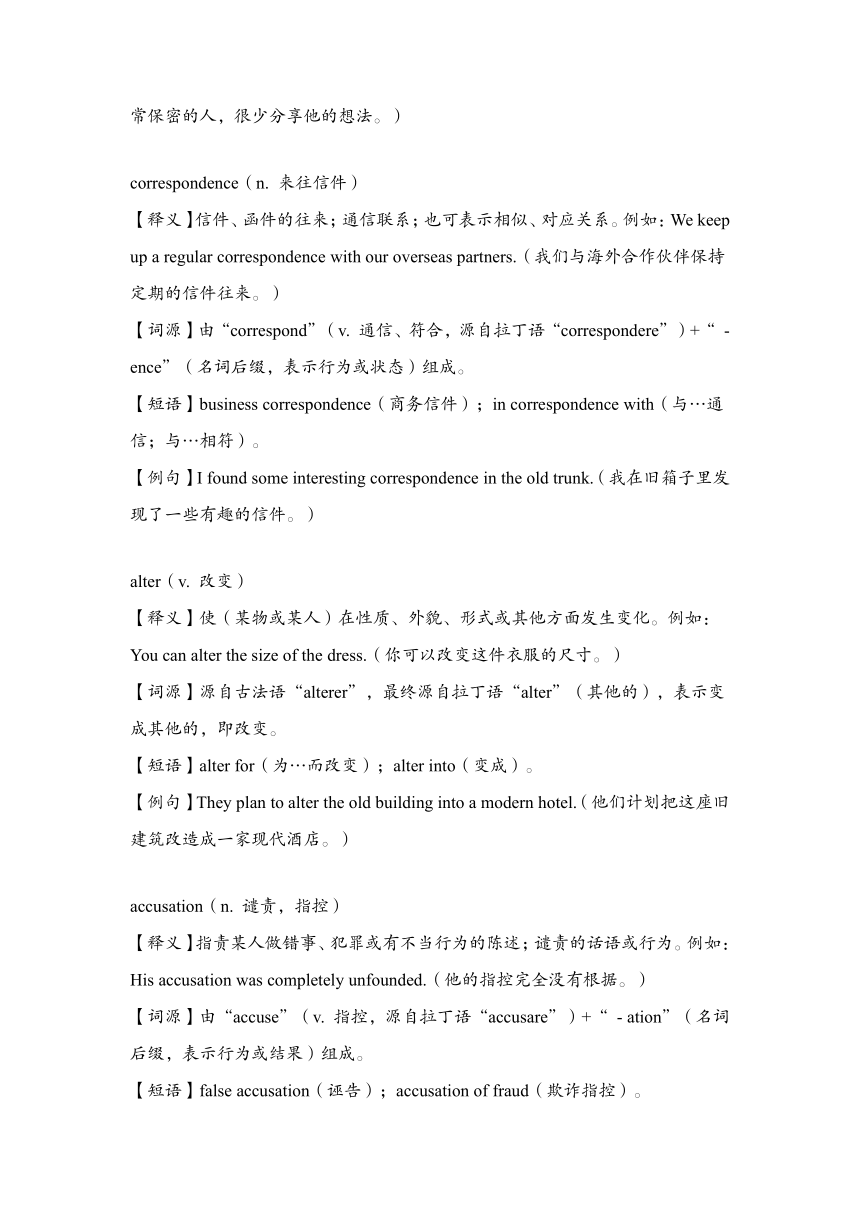新概念第三册 Lesson 53 In the public interest 讲义
文档属性
| 名称 | 新概念第三册 Lesson 53 In the public interest 讲义 |

|
|
| 格式 | docx | ||
| 文件大小 | 361.8KB | ||
| 资源类型 | 教案 | ||
| 版本资源 | 新概念英语 | ||
| 科目 | 英语 | ||
| 更新时间 | 2024-12-05 00:00:00 | ||
图片预览





文档简介
新概念第三册
Lesson 53 In the public interest
单词精讲
evolve v.逐渐形成
【释义】逐渐发展、演变或进化;从一种状态、形式或种类逐渐转变为另一种。例如:The company has evolved over the years.(这家公司多年来逐渐发展变化。)
【词源】源自拉丁语“evolvere”,由“e - ”(出)+“volvere”(卷、滚)组成,原意为展开,后引申为逐渐发展、演变。
【短语】evolve from(从…进化而来);evolve into(发展成、演变成)。
【例句】Birds are thought to have evolved from dinosaurs.(鸟类被认为是从恐龙进化而来的。)
high - handed(adj. 高压的,专横的)
【释义】以一种傲慢、独裁的方式行事,不考虑他人意见或权利地使用权力。例如:His high - handed management style made him unpopular.(他专横的管理风格使他不受欢迎。)
【词源】“high”(高)+“handed”(手的,这里表示手段),表示高高在上地用手段,即专横的。
【短语】high - handed behavior(专横的行为);high - handed decision(专横的决定)。
【例句】The high - handed boss never listened to his employees' suggestions.(那个专横的老板从不听取员工的建议。)
incompetent(adj. 不够格的,不称职的)
【释义】缺乏必要的能力、技能或资格来做某事;不能胜任工作或任务的。例如:An incompetent worker may cause many problems.(一个不称职的工人可能会造成很多问题。)
【词源】由否定前缀“in - ”(不)+“competent”(有能力的,源自拉丁语“competere”)组成,表示没有能力的。
【短语】incompetent person(不称职的人);incompetent performance(不称职的表现)。
【例句】The incompetent teacher couldn't control the class.(这个不够格的老师无法控制课堂。)
over - zealously(adv. 过分热情地)
【释义】以过度、超出正常范围的热情做某事。例如:He over - zealously promoted his new product.(他过分热情地推销他的新产品。)
【词源】由“over - ”(过度)+“zealous”(热情的,源自希腊语“zēlos”)+“ - ly”(副词后缀)组成。
【短语】act over - zealously(行为过分热情)。
【例句】She over - zealously decorated her house for the party.(她过分热情地为聚会装饰房子。)
safeguard(v. 保护)
【释义】采取措施保护某人或某物免受伤害、危险或损失。例如:We need to safeguard our environment.(我们需要保护我们的环境。)
【词源】“safe”(安全的)+“guard”(守卫),表示守卫安全,即保护。
【短语】safeguard against(防范、预防);safeguard one's rights(保护某人的权利)。
【例句】Installing a security system can safeguard your home.(安装一个安全系统可以保护你的家。)
parliamentary(adj. 国会的)
【释义】与议会(国会)相关的;符合议会程序或惯例的。例如:Parliamentary debates can be very intense.(国会辩论可能非常激烈。)
【词源】由“parliament”(n. 议会,源自法语“parlement”)+“ - ary”(形容词后缀)组成。
【短语】parliamentary system(议会制度);parliamentary election(议会选举)。
【例句】The new law was passed through parliamentary procedures.(这项新法律通过国会程序得以通过。)
qualified(adj. 合格的)
【释义】具备做某事所需的技能、知识、资格或条件的;有限制的、有保留的。例如:A qualified doctor has to go through years of study.(一名合格的医生必须经过多年的学习。)
【词源】由“qualify”(v. 使合格,源自拉丁语“qualificare”)+“ - ed”(形容词后缀)组成。
【短语】highly qualified(非常合格的);qualified approval(有保留的批准)。
【例句】Only qualified applicants will be considered for the job.(只有合格的申请人将被考虑这份工作。)
grievance(n. 不平,冤屈)
【释义】一种对不公平待遇、伤害或不公正情况感到不满的情绪;抱怨的原因。例如:The workers had a grievance about their low pay.(工人们对他们的低工资有冤屈。)
【词源】源自古法语“grievance”,与悲伤、痛苦有关,表示因不公平而痛苦,即冤屈。
【短语】air one's grievance(诉说冤屈);grievance procedure(申诉程序)。
【例句】
She filed a grievance against her boss for unfair treatment.(她因受到老板的不公平待遇而提出申诉。)
Justiteombudsman(n. (瑞典的)司法特派员)
【释义】在瑞典,负责调查公民对政府机构或公职人员投诉的官员,以确保公平和公正。例如:The Justiteombudsman helps citizens resolve issues with public services.(瑞典的司法特派员帮助公民解决与公共服务有关的问题。)
【词源】这是一个瑞典语的复合词,“Justite”(司法)+“ombudsman”(特派员)。
【短语】contact the Justiteombudsman(联系瑞典司法特派员)。
【例句】If you have a problem with a Swedish government agency, you can turn to the Justiteombudsman.(如果你对瑞典政府机构有问题,你可以求助于司法特派员。)
ombudsman(n. (瑞典和英国的)司法特派员)
【释义】在瑞典和英国等国家,作为独立的官员,负责调查和处理公众对政府部门、公共机构等的投诉,以保障公民权益。例如:The ombudsman plays an important role in protecting citizens' rights.(司法特派员在保护公民权利方面起着重要作用。)
【词源】源自瑞典语,原意为代表、代理人。
【短语】ombudsman scheme(司法特派员计划);ombudsman office(司法特派员办公室)。
【例句】The ombudsman investigated the complaint about the local council.(司法特派员调查了关于地方议会的投诉。)
secretive(adj. 保密的)
【释义】倾向于保密的,不轻易透露信息或秘密的。例如:The secretive organization keeps its activities hidden.(这个保密的组织对其活动保密。)
【词源】由“secret”(n. 秘密,源自拉丁语“secretum”)+“ - ive”(形容词后缀,表示有…倾向的)组成。
【短语】secretive nature(保密的天性);secretive behavior(保密行为)。
【例句】He is a very secretive person and seldom shares his thoughts.(他是一个非常保密的人,很少分享他的想法。)
correspondence(n. 来往信件)
【释义】信件、函件的往来;通信联系;也可表示相似、对应关系。例如:We keep up a regular correspondence with our overseas partners.(我们与海外合作伙伴保持定期的信件往来。)
【词源】由“correspond”(v. 通信、符合,源自拉丁语“correspondere”)+“ - ence”(名词后缀,表示行为或状态)组成。
【短语】business correspondence(商务信件);in correspondence with(与…通信;与…相符)。
【例句】I found some interesting correspondence in the old trunk.(我在旧箱子里发现了一些有趣的信件。)
alter(v. 改变)
【释义】使(某物或某人)在性质、外貌、形式或其他方面发生变化。例如:You can alter the size of the dress.(你可以改变这件衣服的尺寸。)
【词源】源自古法语“alterer”,最终源自拉丁语“alter”(其他的),表示变成其他的,即改变。
【短语】alter for(为…而改变);alter into(变成)。
【例句】They plan to alter the old building into a modern hotel.(他们计划把这座旧建筑改造成一家现代酒店。)
accusation(n. 谴责,指控)
【释义】指责某人做错事、犯罪或有不当行为的陈述;谴责的话语或行为。例如:His accusation was completely unfounded.(他的指控完全没有根据。)
【词源】由“accuse”(v. 指控,源自拉丁语“accusare”)+“ - ation”(名词后缀,表示行为或结果)组成。
【短语】false accusation(诬告);accusation of fraud(欺诈指控)。
【例句】She faced an accusation of stealing.(她面临盗窃的指控。)
ascertain(v. 查出,查明)
【释义】找出事实、真相或确切的信息;确定某事。例如:The police are trying to ascertain the cause of the accident.(警方正在试图查明事故的原因。)
【词源】由“as - ”(到、向)+“certain”(确定的,源自拉丁语“certus”)组成,表示使确定,即查明。
【短语】ascertain the truth(查明真相);ascertain from(从…查明)。
【例句】We need to ascertain the number of people attending the event.(我们需要查明参加活动的人数。)
prejudiced(adj. 有偏见的,不公平的)
【释义】对某人或某事持有预先形成的、不合理的观点或态度,通常是负面的;偏袒或歧视的。例如:A prejudiced judge cannot make a fair decision.(一个有偏见的法官不能做出公平的决定。)
【词源】由“prejudice”(n. 偏见,源自拉丁语“praejudicium”)+“ - ed”(形容词后缀)组成。
【短语】be prejudiced against(对…有偏见);prejudiced attitude(偏见态度)。
【例句】Some people are prejudiced against foreigners.(有些人对外国人有偏见。)
prompt(adj. 即时的)
【释义】立即的、迅速的;按时的、准时的。例如:We need a prompt response to this issue.(我们需要对这个问题有一个即时的回应。)
【词源】可能源自古法语“prompte”,有敏捷、迅速的意思。
【短语】prompt action(迅速行动);prompt delivery(即时交货)。
【例句】The company offers prompt service to its customers.(这家公司为其顾客提供即时服务。)
二、课文精讲
1.The Scandinavian countries are much admired all over the world for their enlightened social policies.斯堪的纳维亚半岛各国实行开明的社会政策,受到全世界的推崇。
be admired不要译为“被喜欢”或者“被崇拜”,正确的译法应该是“受到推崇。”
2.Sweden has evolved an excellent system for protecting the individual citizen from high-handed or incompetent public officers.在瑞典,已逐渐形成了一种完善的制度以保护每个公民不受专横的和不称职的政府官员的欺压。
protect from的意思是“保护…不受…”。
3.The system has worked so well, that it has been adopted in other countries too.由于这种制度行之有效,已被其他国家采纳。
so…that…引导结果状语从句。
语言点2:be adopted的意思是“被采纳,被接受。”
4.The Swedes were the first to recognize that public official like civil servants, police officers, health inspectors or tax-collectors can make mistakes or act over-zealously in the belief that they are serving the public.是瑞典人首先认识到政府工作人员如文职人员、警官、卫生稽查员、税务人员等等也会犯错误或者自以为在为公众服务而把事情做过了头。
recognise后面的that引导宾语从句;belief后面的that引导同位语从句,解释说明belief。
5.As long ago as 1809, the Swedish Parliament introduced a scheme to safeguard the interest of the individual.早在1809年,瑞典论会就建立一个保护公民利益的制度。
as long ago as往往被译为“早在。”
6.A parliamentary committee representing all political parties appoints a person who is suitably qualified to investigate private grievances against the State.议会内有一个代表各政党利益的委员会,由它委派一位称职的人选专门调查个人对国家的意见。
committee与represent是逻辑上的主谓关系,只是represent用了现在分词的形式,引导现在分词短语作committee的定语。
be qualified to do sth.的意思是“有资格做某事。”
7.The official title of the person is 'Justiteombudsman', but the Swedes commonly refer to him as the 'J.O.' or 'Ombudsman'.此人官衔为“司法特派员”,但瑞典人一般管他叫“J.O.”,即“司法特派员”。
refer to意思是“把…称作。”
8.The Ombudsman is not subject to political pressure.司法特派员不受任何政治压力的制约。
be subject to的意思是“受到…的制约。”
9.He investigates complaints large and small that come to him from all levels of society. 他听取社会各阶层的各种大小意见,并进行调查。
that come to him from all levels of society是定语从句,修饰complaints。
10.As complaints must be made in writing, the Ombudsman receives an average of 1,200 letters a year.由于意见均需用书面形式提出,司法特派员每年平均收到1,200封信。
in writing是方式状语。
11.He has eight lawyer assistants to help him and examines every single letter in detail.他有8位律师作他的助手协助工作,每封信都详细批阅。
to help him作宾语补足语。
12.There is nothing secretive about the Ombudsman's work, for his correspondence is open to public inspection.司法特派员的工作没有什么秘密可言,他的信件是公开的,供公众监督。
形容词secretive作定语,修饰nothing。在修饰不定代词时,形容词一般放在被修饰的不定代词后。
be open to的意思是“向…公开。”
13.If a citizen's complaint is justified, the Ombudsman will act on his behalf.如果公民的意见正确,司法特派员便为他伸张正义。
on one’s behalf的意思是“为了某人的利益,代表某人。”
14.The action he takes varies according to the nature of the complaint.司法特员采取的行动因意见的性质不同而有所不同。
according to的意思是“根据,按照。”
15.He may gently reprimand an official or even suggest to parliament that a law be altered.他可以善意地批评某位官员,也可以甚至向议会提议修改某项法律。
gently reprimand不可译为“温柔地批评”,而是“善意地批评。”
16.The following case is a typical example of the Ombudsman's work.下述事件是司法特派员工作的一个典型例子。
a typical example的意思是“一个典型的例子。”
17.A foreigner living in a Swedish village wrote to the Ombudsman complaining that he had been ill-treated by the police, simply because he was a foreigner.一个住在瑞典乡村的外国人写信给司法特派员,抱怨说他受到警察的虐待,原因就是因为他是个外国人。
that引导宾语从句。
18.The Ombudsman immediately wrote to the Chief of Police in the district asking him to send a record of the case.司法特派员立即写信给当地警察局长,请他寄送与此事有关的材料。
in the district作后置定语。现在分词短语asking him to send a record of the case作目的状语。
19.There was nothing in the record to show that the foreigner's complaint was justified and the Chief of Police strongly denied the accusation.材料中没有任何文字记载证明外国人所说的情况符合事实,警察局长矢口否认这一指控。
that引导宾语从句。
20.It was impossible for the Ombudsman to take action, but when he received a similar complaint from another foreigner in the same village, he immediately sent one of his lawyers to investigate the matter.司法特派员难以处理。但是,当他又收到住在同一村庄的另一个外国人写的一封内容类似的投诉信时,他立即派出一位律师前去调查。
it is/was impossible for…to do已经成了固定结构,表示“…做…是不可能的。”
21.The lawyer ascertained that a policeman had indeed dealt roughly with foreigners on several occasions.律师证实有个警察确实多次粗鲁地对待外国人。
that引导宾语从句。
on several occasions的意思是“在不同的场合”,引申为“多次。”
22.The fact that the policeman was prejudiced against foreigners could not be recorded in the official files.警察歧视外国人的事在官方档案中不可能加以记载。
that引导同位语从句。
be prejudiced against意为“歧视。”
23.It was only possible for the Ombudsman to find this out by sending one of his representatives to check the facts.司法特派员只有派他的代表去核对事实才能了解真相。
it is/was only possible for sb.to do sth.的意思是“对某人而言只有做某事才行了。”
24.The policeman in question was severely reprimanded and was informed that if any further complaints were lodged against him, he would be prosecuted.当事的警察受到严厉的斥责,并被告知,如果再有人投诉他,他将受到起诉。
that引导宾语从句。
be lodged against的意思是“针对。”
25.The Ombudsman's prompt action at once put an end to an unpleasant practice which might have gone unnoticed.司法特派员及时采取的行动,迅速制止了这一起不愉快的事件,不然这件事可能因未得到人们注意而不了了之。
put an end to的意思是“结束,制止。”
Lesson 53 In the public interest
单词精讲
evolve v.逐渐形成
【释义】逐渐发展、演变或进化;从一种状态、形式或种类逐渐转变为另一种。例如:The company has evolved over the years.(这家公司多年来逐渐发展变化。)
【词源】源自拉丁语“evolvere”,由“e - ”(出)+“volvere”(卷、滚)组成,原意为展开,后引申为逐渐发展、演变。
【短语】evolve from(从…进化而来);evolve into(发展成、演变成)。
【例句】Birds are thought to have evolved from dinosaurs.(鸟类被认为是从恐龙进化而来的。)
high - handed(adj. 高压的,专横的)
【释义】以一种傲慢、独裁的方式行事,不考虑他人意见或权利地使用权力。例如:His high - handed management style made him unpopular.(他专横的管理风格使他不受欢迎。)
【词源】“high”(高)+“handed”(手的,这里表示手段),表示高高在上地用手段,即专横的。
【短语】high - handed behavior(专横的行为);high - handed decision(专横的决定)。
【例句】The high - handed boss never listened to his employees' suggestions.(那个专横的老板从不听取员工的建议。)
incompetent(adj. 不够格的,不称职的)
【释义】缺乏必要的能力、技能或资格来做某事;不能胜任工作或任务的。例如:An incompetent worker may cause many problems.(一个不称职的工人可能会造成很多问题。)
【词源】由否定前缀“in - ”(不)+“competent”(有能力的,源自拉丁语“competere”)组成,表示没有能力的。
【短语】incompetent person(不称职的人);incompetent performance(不称职的表现)。
【例句】The incompetent teacher couldn't control the class.(这个不够格的老师无法控制课堂。)
over - zealously(adv. 过分热情地)
【释义】以过度、超出正常范围的热情做某事。例如:He over - zealously promoted his new product.(他过分热情地推销他的新产品。)
【词源】由“over - ”(过度)+“zealous”(热情的,源自希腊语“zēlos”)+“ - ly”(副词后缀)组成。
【短语】act over - zealously(行为过分热情)。
【例句】She over - zealously decorated her house for the party.(她过分热情地为聚会装饰房子。)
safeguard(v. 保护)
【释义】采取措施保护某人或某物免受伤害、危险或损失。例如:We need to safeguard our environment.(我们需要保护我们的环境。)
【词源】“safe”(安全的)+“guard”(守卫),表示守卫安全,即保护。
【短语】safeguard against(防范、预防);safeguard one's rights(保护某人的权利)。
【例句】Installing a security system can safeguard your home.(安装一个安全系统可以保护你的家。)
parliamentary(adj. 国会的)
【释义】与议会(国会)相关的;符合议会程序或惯例的。例如:Parliamentary debates can be very intense.(国会辩论可能非常激烈。)
【词源】由“parliament”(n. 议会,源自法语“parlement”)+“ - ary”(形容词后缀)组成。
【短语】parliamentary system(议会制度);parliamentary election(议会选举)。
【例句】The new law was passed through parliamentary procedures.(这项新法律通过国会程序得以通过。)
qualified(adj. 合格的)
【释义】具备做某事所需的技能、知识、资格或条件的;有限制的、有保留的。例如:A qualified doctor has to go through years of study.(一名合格的医生必须经过多年的学习。)
【词源】由“qualify”(v. 使合格,源自拉丁语“qualificare”)+“ - ed”(形容词后缀)组成。
【短语】highly qualified(非常合格的);qualified approval(有保留的批准)。
【例句】Only qualified applicants will be considered for the job.(只有合格的申请人将被考虑这份工作。)
grievance(n. 不平,冤屈)
【释义】一种对不公平待遇、伤害或不公正情况感到不满的情绪;抱怨的原因。例如:The workers had a grievance about their low pay.(工人们对他们的低工资有冤屈。)
【词源】源自古法语“grievance”,与悲伤、痛苦有关,表示因不公平而痛苦,即冤屈。
【短语】air one's grievance(诉说冤屈);grievance procedure(申诉程序)。
【例句】
She filed a grievance against her boss for unfair treatment.(她因受到老板的不公平待遇而提出申诉。)
Justiteombudsman(n. (瑞典的)司法特派员)
【释义】在瑞典,负责调查公民对政府机构或公职人员投诉的官员,以确保公平和公正。例如:The Justiteombudsman helps citizens resolve issues with public services.(瑞典的司法特派员帮助公民解决与公共服务有关的问题。)
【词源】这是一个瑞典语的复合词,“Justite”(司法)+“ombudsman”(特派员)。
【短语】contact the Justiteombudsman(联系瑞典司法特派员)。
【例句】If you have a problem with a Swedish government agency, you can turn to the Justiteombudsman.(如果你对瑞典政府机构有问题,你可以求助于司法特派员。)
ombudsman(n. (瑞典和英国的)司法特派员)
【释义】在瑞典和英国等国家,作为独立的官员,负责调查和处理公众对政府部门、公共机构等的投诉,以保障公民权益。例如:The ombudsman plays an important role in protecting citizens' rights.(司法特派员在保护公民权利方面起着重要作用。)
【词源】源自瑞典语,原意为代表、代理人。
【短语】ombudsman scheme(司法特派员计划);ombudsman office(司法特派员办公室)。
【例句】The ombudsman investigated the complaint about the local council.(司法特派员调查了关于地方议会的投诉。)
secretive(adj. 保密的)
【释义】倾向于保密的,不轻易透露信息或秘密的。例如:The secretive organization keeps its activities hidden.(这个保密的组织对其活动保密。)
【词源】由“secret”(n. 秘密,源自拉丁语“secretum”)+“ - ive”(形容词后缀,表示有…倾向的)组成。
【短语】secretive nature(保密的天性);secretive behavior(保密行为)。
【例句】He is a very secretive person and seldom shares his thoughts.(他是一个非常保密的人,很少分享他的想法。)
correspondence(n. 来往信件)
【释义】信件、函件的往来;通信联系;也可表示相似、对应关系。例如:We keep up a regular correspondence with our overseas partners.(我们与海外合作伙伴保持定期的信件往来。)
【词源】由“correspond”(v. 通信、符合,源自拉丁语“correspondere”)+“ - ence”(名词后缀,表示行为或状态)组成。
【短语】business correspondence(商务信件);in correspondence with(与…通信;与…相符)。
【例句】I found some interesting correspondence in the old trunk.(我在旧箱子里发现了一些有趣的信件。)
alter(v. 改变)
【释义】使(某物或某人)在性质、外貌、形式或其他方面发生变化。例如:You can alter the size of the dress.(你可以改变这件衣服的尺寸。)
【词源】源自古法语“alterer”,最终源自拉丁语“alter”(其他的),表示变成其他的,即改变。
【短语】alter for(为…而改变);alter into(变成)。
【例句】They plan to alter the old building into a modern hotel.(他们计划把这座旧建筑改造成一家现代酒店。)
accusation(n. 谴责,指控)
【释义】指责某人做错事、犯罪或有不当行为的陈述;谴责的话语或行为。例如:His accusation was completely unfounded.(他的指控完全没有根据。)
【词源】由“accuse”(v. 指控,源自拉丁语“accusare”)+“ - ation”(名词后缀,表示行为或结果)组成。
【短语】false accusation(诬告);accusation of fraud(欺诈指控)。
【例句】She faced an accusation of stealing.(她面临盗窃的指控。)
ascertain(v. 查出,查明)
【释义】找出事实、真相或确切的信息;确定某事。例如:The police are trying to ascertain the cause of the accident.(警方正在试图查明事故的原因。)
【词源】由“as - ”(到、向)+“certain”(确定的,源自拉丁语“certus”)组成,表示使确定,即查明。
【短语】ascertain the truth(查明真相);ascertain from(从…查明)。
【例句】We need to ascertain the number of people attending the event.(我们需要查明参加活动的人数。)
prejudiced(adj. 有偏见的,不公平的)
【释义】对某人或某事持有预先形成的、不合理的观点或态度,通常是负面的;偏袒或歧视的。例如:A prejudiced judge cannot make a fair decision.(一个有偏见的法官不能做出公平的决定。)
【词源】由“prejudice”(n. 偏见,源自拉丁语“praejudicium”)+“ - ed”(形容词后缀)组成。
【短语】be prejudiced against(对…有偏见);prejudiced attitude(偏见态度)。
【例句】Some people are prejudiced against foreigners.(有些人对外国人有偏见。)
prompt(adj. 即时的)
【释义】立即的、迅速的;按时的、准时的。例如:We need a prompt response to this issue.(我们需要对这个问题有一个即时的回应。)
【词源】可能源自古法语“prompte”,有敏捷、迅速的意思。
【短语】prompt action(迅速行动);prompt delivery(即时交货)。
【例句】The company offers prompt service to its customers.(这家公司为其顾客提供即时服务。)
二、课文精讲
1.The Scandinavian countries are much admired all over the world for their enlightened social policies.斯堪的纳维亚半岛各国实行开明的社会政策,受到全世界的推崇。
be admired不要译为“被喜欢”或者“被崇拜”,正确的译法应该是“受到推崇。”
2.Sweden has evolved an excellent system for protecting the individual citizen from high-handed or incompetent public officers.在瑞典,已逐渐形成了一种完善的制度以保护每个公民不受专横的和不称职的政府官员的欺压。
protect from的意思是“保护…不受…”。
3.The system has worked so well, that it has been adopted in other countries too.由于这种制度行之有效,已被其他国家采纳。
so…that…引导结果状语从句。
语言点2:be adopted的意思是“被采纳,被接受。”
4.The Swedes were the first to recognize that public official like civil servants, police officers, health inspectors or tax-collectors can make mistakes or act over-zealously in the belief that they are serving the public.是瑞典人首先认识到政府工作人员如文职人员、警官、卫生稽查员、税务人员等等也会犯错误或者自以为在为公众服务而把事情做过了头。
recognise后面的that引导宾语从句;belief后面的that引导同位语从句,解释说明belief。
5.As long ago as 1809, the Swedish Parliament introduced a scheme to safeguard the interest of the individual.早在1809年,瑞典论会就建立一个保护公民利益的制度。
as long ago as往往被译为“早在。”
6.A parliamentary committee representing all political parties appoints a person who is suitably qualified to investigate private grievances against the State.议会内有一个代表各政党利益的委员会,由它委派一位称职的人选专门调查个人对国家的意见。
committee与represent是逻辑上的主谓关系,只是represent用了现在分词的形式,引导现在分词短语作committee的定语。
be qualified to do sth.的意思是“有资格做某事。”
7.The official title of the person is 'Justiteombudsman', but the Swedes commonly refer to him as the 'J.O.' or 'Ombudsman'.此人官衔为“司法特派员”,但瑞典人一般管他叫“J.O.”,即“司法特派员”。
refer to意思是“把…称作。”
8.The Ombudsman is not subject to political pressure.司法特派员不受任何政治压力的制约。
be subject to的意思是“受到…的制约。”
9.He investigates complaints large and small that come to him from all levels of society. 他听取社会各阶层的各种大小意见,并进行调查。
that come to him from all levels of society是定语从句,修饰complaints。
10.As complaints must be made in writing, the Ombudsman receives an average of 1,200 letters a year.由于意见均需用书面形式提出,司法特派员每年平均收到1,200封信。
in writing是方式状语。
11.He has eight lawyer assistants to help him and examines every single letter in detail.他有8位律师作他的助手协助工作,每封信都详细批阅。
to help him作宾语补足语。
12.There is nothing secretive about the Ombudsman's work, for his correspondence is open to public inspection.司法特派员的工作没有什么秘密可言,他的信件是公开的,供公众监督。
形容词secretive作定语,修饰nothing。在修饰不定代词时,形容词一般放在被修饰的不定代词后。
be open to的意思是“向…公开。”
13.If a citizen's complaint is justified, the Ombudsman will act on his behalf.如果公民的意见正确,司法特派员便为他伸张正义。
on one’s behalf的意思是“为了某人的利益,代表某人。”
14.The action he takes varies according to the nature of the complaint.司法特员采取的行动因意见的性质不同而有所不同。
according to的意思是“根据,按照。”
15.He may gently reprimand an official or even suggest to parliament that a law be altered.他可以善意地批评某位官员,也可以甚至向议会提议修改某项法律。
gently reprimand不可译为“温柔地批评”,而是“善意地批评。”
16.The following case is a typical example of the Ombudsman's work.下述事件是司法特派员工作的一个典型例子。
a typical example的意思是“一个典型的例子。”
17.A foreigner living in a Swedish village wrote to the Ombudsman complaining that he had been ill-treated by the police, simply because he was a foreigner.一个住在瑞典乡村的外国人写信给司法特派员,抱怨说他受到警察的虐待,原因就是因为他是个外国人。
that引导宾语从句。
18.The Ombudsman immediately wrote to the Chief of Police in the district asking him to send a record of the case.司法特派员立即写信给当地警察局长,请他寄送与此事有关的材料。
in the district作后置定语。现在分词短语asking him to send a record of the case作目的状语。
19.There was nothing in the record to show that the foreigner's complaint was justified and the Chief of Police strongly denied the accusation.材料中没有任何文字记载证明外国人所说的情况符合事实,警察局长矢口否认这一指控。
that引导宾语从句。
20.It was impossible for the Ombudsman to take action, but when he received a similar complaint from another foreigner in the same village, he immediately sent one of his lawyers to investigate the matter.司法特派员难以处理。但是,当他又收到住在同一村庄的另一个外国人写的一封内容类似的投诉信时,他立即派出一位律师前去调查。
it is/was impossible for…to do已经成了固定结构,表示“…做…是不可能的。”
21.The lawyer ascertained that a policeman had indeed dealt roughly with foreigners on several occasions.律师证实有个警察确实多次粗鲁地对待外国人。
that引导宾语从句。
on several occasions的意思是“在不同的场合”,引申为“多次。”
22.The fact that the policeman was prejudiced against foreigners could not be recorded in the official files.警察歧视外国人的事在官方档案中不可能加以记载。
that引导同位语从句。
be prejudiced against意为“歧视。”
23.It was only possible for the Ombudsman to find this out by sending one of his representatives to check the facts.司法特派员只有派他的代表去核对事实才能了解真相。
it is/was only possible for sb.to do sth.的意思是“对某人而言只有做某事才行了。”
24.The policeman in question was severely reprimanded and was informed that if any further complaints were lodged against him, he would be prosecuted.当事的警察受到严厉的斥责,并被告知,如果再有人投诉他,他将受到起诉。
that引导宾语从句。
be lodged against的意思是“针对。”
25.The Ombudsman's prompt action at once put an end to an unpleasant practice which might have gone unnoticed.司法特派员及时采取的行动,迅速制止了这一起不愉快的事件,不然这件事可能因未得到人们注意而不了了之。
put an end to的意思是“结束,制止。”
同课章节目录
